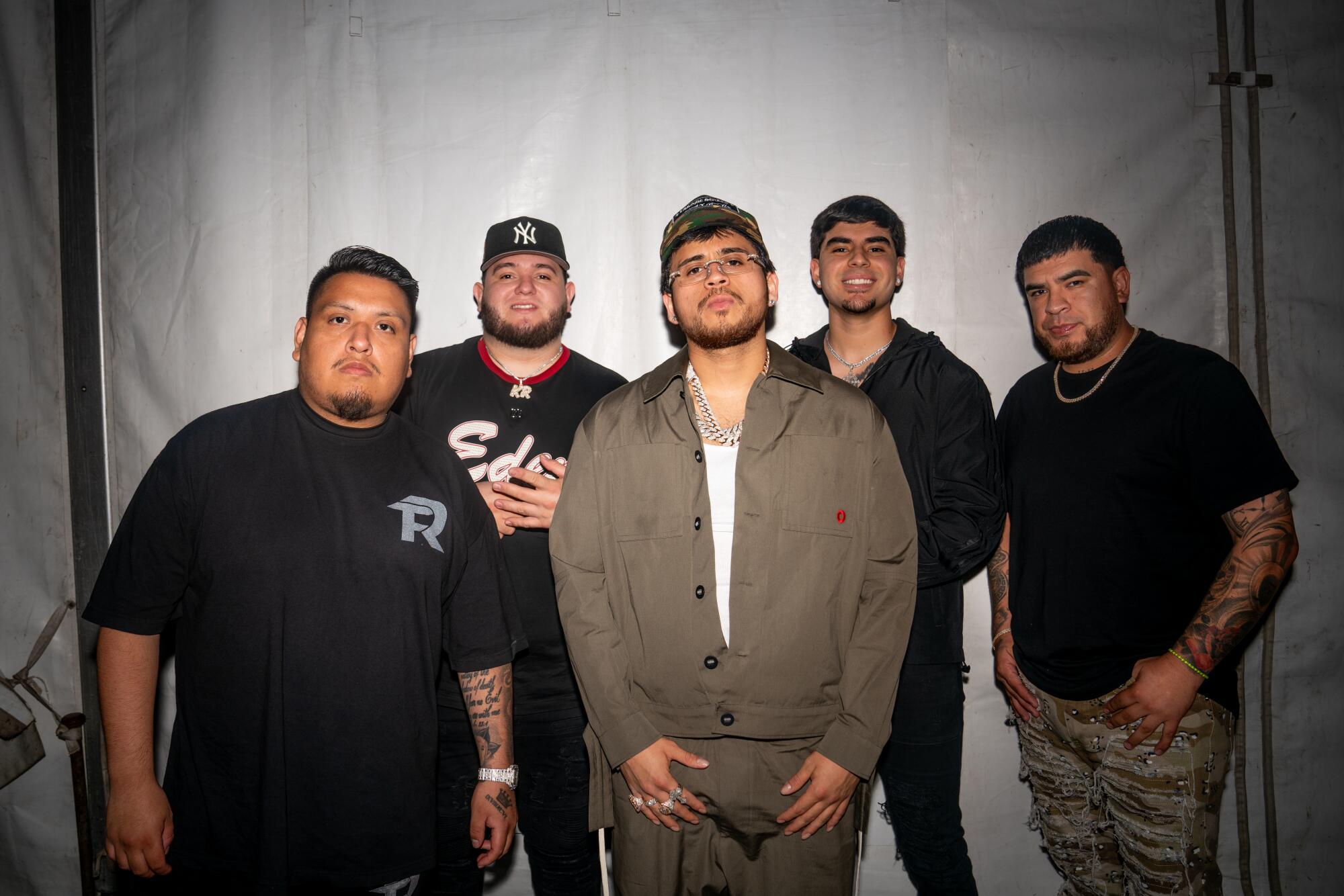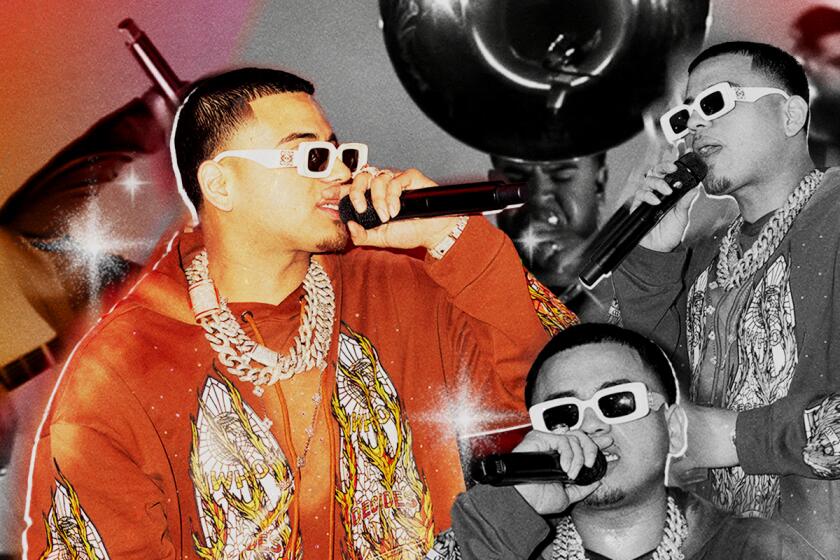
- Share via
What a difference two years can make.
In March 2022, Fuerza Regida embarked on a guerrilla marketing campaign to promote an upcoming show at the Toyota Arena in Ontario, Calif. The San Bernardino-based quintet had already reached the top of Billboard’s U.S. Regional Mexican chart twice, with 2019’s “Del Barrio Hasta Aqui” and 2020’s “Adicto,” two albums full of corridos tumbados, or trap corridos, which blend elements of traditional Mexican music— requinto guitars and a brass rhythm section— with hip-hop-like lyrics in Spanish about trapping, drug dealing and hustling. Despite the success, there were still plenty of unsold tickets left. Equipped with a megaphone, the band members’ instruments, a camera crew and a desire to see every seat filled for what would be a hometown concert, Fuerza Regida showed up unannounced at nearby Arroyo Valley and San Bernardino high schools and performed a quick set for students before moving on to the Ontario Mills mall, where it regaled unsuspecting shoppers.
Fuerza Regida embodies the idea that if you work hard enough, you can achieve your version of the American dream.
But what created the biggest buzz from this traveling road show was the band’s final impromptu performance, which took place in the middle of the westbound 10 Freeway, right in front of the Toyota Arena. In a video clip posted to Fuerza Regida frontman Jesús Ortiz Paz’s TikTok account, we see the band’s caravan of vehicles block all five lanes as it plays a banda rendition of “El Muchacho Alegre,” a song popularized by legendary mariachi singer Pedro Infante. The stunt went viral, accruing millions of views and thousands of comments, many admonishing Fuerza Regida for bringing traffic to a standstill while others praised the members for their ingenuity.
By the day of the concert, every ticket had been sold.
“Back then, we would have to pull up [to a city] early to promote because we weren’t selling out like that. Thank God we don’t have to do that anymore,” Ortiz Paz, better known as J.O.P., says in between bites of baby carrots and hummus.
It’s a mid-July afternoon and I’m sitting with the 27-year-old singer and his entourage of at least a dozen people at a fast-casual Mediterranean restaurant in downtown Culver City, an hourlong pit stop in a day crammed with interviews to promote “Pero No Te Enamores,” Fuerza Regida’s eighth studio album (released July 25 on Rancho Humilde Records and Street Mob Records). Before speaking with The Times, J.O.P. joined Apple Music DJ Zane Lowe to record an episode of the streamer’s “New Music Daily” radio show. After lunch, it was off to Burbank to be interviewed by DJ Bootleg Kev for his syndicated hip-hop program. In a few days, J.O.P. and the rest of the band — requinto guitarist Samuel Jaimez, guitarron player Khrystian Ramos, tubist José Garcia and tololoche player Moises Lopez — would fly out to Dallas to resume a nationwide arena tour that has sold out most dates and will culminate with two shows at Inglewood’s Intuit Dome in mid-November.

“We’re doing just English media today. We’ve never really done anything with that market before,” J.O.P. says with a hint of satisfaction in his voice.
That the English-language music press has taken an interest in covering the release of “Pero No Te Enamores,” an album recorded in Spanish, is a testament to the rising popularity of música Mexicana in the U.S. and Fuerza Regida’s role in its growth. Once considered niche, it has been pushed into the mainstream on the heels of the pandemic by a bevy of acts who built their audiences on YouTube and TikTok before conquering the streaming services. According to entertainment data analysis company Luminate, Latin music was the fastest-growing genre in the U.S. on platforms like Spotify and Apple Music during the first half of 2024 thanks in large part to música Mexicana. The subgenre is hardly a cultural import. Many of its young stars and their ever-growing fan bases are based on this side of the border.
“I feel like people in the U.S. identify themselves with Fuerza Regida,” J.O.P. says. “All the no sabos, all the pochos, they know our culture is a different culture being born over here [rather] than over there.”
According to Luminate’s midyear music report, Latin music is the genre that has seen the highest growth rate over the last year.
Música Mexicana’s dominance is most apparent in Southern California, home to the country’s largest Mexican American population. As of this writing, 14 of the 25 songs listed on Apple Music’s daily trending chart for Los Angeles belong to the genre, sharing space with the likes of pop “it” girl Sabrina Carpenter and Kendrick Lamar’s epic diss track “Not Like Us.” Of these, six are Fuerza Regida songs.
The band got its start in 2015 by playing covers at parties and local venues in San Bernardino, and the rollicking good times haven’t stopped since — its concerts are notoriously boozy, boisterous affairs. Fuerza Regida’s specialty is making earworms meant to be played loudly, whether it be “Radicamos en South Central,” its first hit, a corrido tumbado from 2018 about building a drug empire brick by brick; “Bebe Dame,” a romantic cumbia recorded with Tex-Mex act Grupo Frontera in 2022; or “Tu Name,” a scornful rebuff released earlier this year about moving on and forgetting someone by sleeping with other women.

Besides its ability to make infectious party anthems, Fuerza Regida’s success can be attributed to its prolificness. Over the last two years, the group has released four albums and one EP, all of which cracked the Billboard 200 top albums chart for all genres. When not recording, Fuerza Regida has been on the road, playing close to 100 shows over the same period.
“I was a businessman before I was an artist,” J.O.P., who oversees the creative direction of Fuerza Regida, says of his entrepreneurial approach to the music industry as the diamond-encrusted logo of Street Mob Records dangles from his neck. Not content with just being a musician, he founded the independent music label in 2019. Since then, he’s signed Calle 24 and Chino Pacas, two of the most promising artists in música Mexicana.
“My dad works in construction and he likes what he does. He’s been doing it for 35 years. He doesn’t have to work anymore but he still goes in because he enjoys it,” says J.O.P. “I’m the same way. I go to the office, put in 14-hour days, go home and I’m happy.”
“Pero No Te Enamores” is Fuerza Regida’s most ambitious project to date, one that puts the pliancy of musica Méxicana to the test. Throughout its history, Mexican music has borrowed from and incorporated other genres into its fold — the accordion, a staple of conjunto and norteño, was first introduced to the country in the late 19th century by Czech and German immigrants through polkas; cumbia arrived from Colombia in the 1940s. With its latest, Fuerza Regida is adding electronic dance music to the mix.
“Jersey corridos, make sure you put that in there, “ J.O.P. says, giving a name to the fusion of Jersey club, drill, house music and corridos found on the album.
Fuerza Regida first dipped its toes in the EDM waters last year with “Harley Quinn,” an uptempo collaboration with DJ Marshmello that’s heavy on the horns — the single, off of “Pa’ Las Baby’s y Belikeada,” peaked at No. 40 on Billboard’s Hot 100. With “Pero No Te Enamores,” the band dives headfirst from the deep end of the pool. To make the 15-track record, Fuerza Regida enlisted producers Gordo (who worked on Drake’s 2022 album “Honestly, Never Mind”) and Synthetic (he produced Lil Uzi Vert’s 2023 single “Just Wanna Rock”), and collaborated with EDM heavy hitters DJ Afrojack and Major Lazer.
The hybrid sound of Jersey corridos is most apparent in tracks like “Bella” and “Secreto Victoria,” which seamlessly blend guitar instrumentation with catchy dance beats. In some cases, Fuerza Regida abandons the música Mexicana sound altogether — “Nel,” the album’s lead single, is closer to reggaeton.

“The album is all summer vibes, very EDM, but it doesn’t lose the lingo of Fuerza — the album is all Fuerza’d out,” J.O.P. says. Lyrically, “Pero No Te Enamores,” which translates to “but don’t fall in love,” comes from the perspective of someone who’s having too much fun being rich, famous and single — a recurring theme in the band’s extensive body of work.
If fans were upset about the experimental turn taken with the record, that dissatisfaction was not reflected on the charts. Within 24 hours after its release, “Pero No Te Enamores” jumped to the No. 1 spot on Apple Music’s all-genres list. The following week, it debuted at No. 25 on the Billboard 200.
Despite the success of the record, J.O.P. says the band is not done with corridos.
“I love Jersey club, so when we decided to make a dance album, we knew it was going to be this. I don’t want to make different types of music throughout my career. I wanted to do this album and then go back to my original stuff,” he said, hinting that the next album was already in the works.
Nor is J.O.P. done with taking a do-it-yourself approach to promoting Fuerza Regida’s music. On the day of the release of “Pero No Te Enamores,” the frontman and his crew hosted two free listening parties in the Los Angeles area. The first was an afternoon flash pop-up at a beachside mansion in Santa Monica, where hundreds of people showed up after the location was posted on the band’s Instagram account. Later that night, the party moved over to Boyle Heights nightclub Don Quixote for an event sponsored by Spotify that included free drinks and tote bags with the album’s logo — a crossed-out heart— screen-printed on the spot. These functions, J.O.P. says, are a way to thank the band’s core fan base.
“We like to do something for the people that can’t really afford a ticket to our shows. We have to do our shows, that’s how we make our money and live, but we always want to do something for the fans,” he tells me during a brief follow-up interview an hour after the Boyle Heights party ended. It’s late at night and we are standing in the driveway of the Mulholland Drive mansion he rented to rest up after bouncing around the city all day.
“I’m tired but in a good way. We love it. I can’t see myself doing something else,” he says before thanking me for my time and heading back inside. The following day, he and the band would fly out to Atlanta to continue the tour.
More to Read
The Latinx experience chronicled
Get the Latinx Files newsletter for stories that capture the multitudes within our communities.
You may occasionally receive promotional content from the Los Angeles Times.









